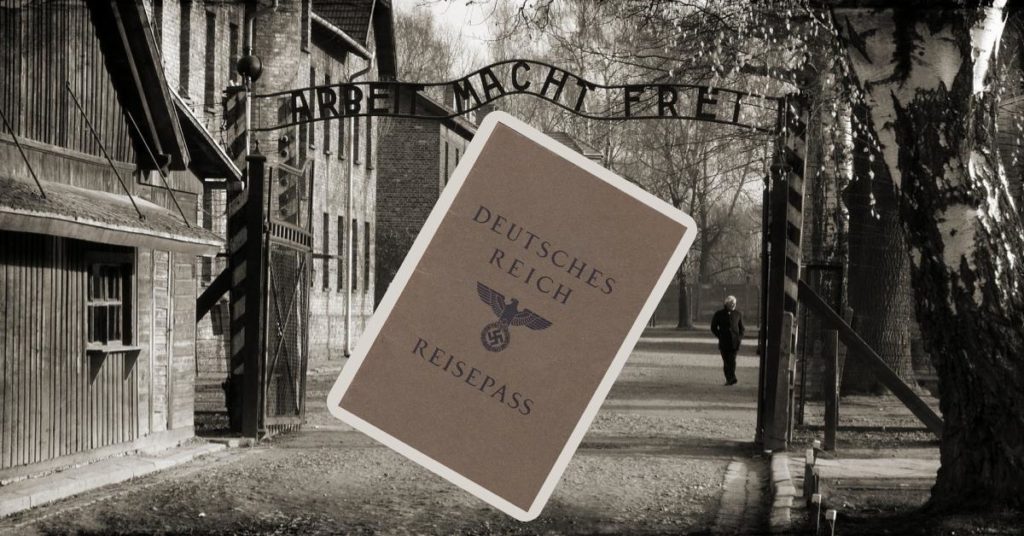We are going to take a bit of a break from the schemers behind the black market passport business in 1930s Berlin and focus on a few of the desperate Jewish clients who sought to escape Nazi Germany..
****
Before I begin this blog, I need to acknowledge Lily’s granddaughter, Sylvia, who has welcomed me into her home and helped me untangle the life of Lily Knips.
When Josef Jakobs landed in England, he had one person with whom he planned to make contact, Frau Lily Knips living at 19 Compayne Gardens in London. The MI5 officers were naturally interested in anyone with whom a German spy planned to make contact and questioned Frau Knips at her flat in London. In this instance we have not only the testimony of Josef Jakobs but also that of Frau Lily Knips. Their stories about Ziebell and the passport business jived fairly well.
Home in Hannover
Lily was born on 20 July, 1891, in the city of Hannover to German Jewish parents Jacob Katz and Jenny Goldschmidt. Lily’s parents already had a young daughter, Elsa, born on 22 March, 1890. The narrow age difference likely meant that Elsa and Lily played together quite a bit as children. Both of the girls were baptized at the Evangelical-Lutheran Pauluskirche in Hannover on 14 October 1907. A Christian baptism would not be enough, however, to protect them from the wrath of the Nazis 30 years later.
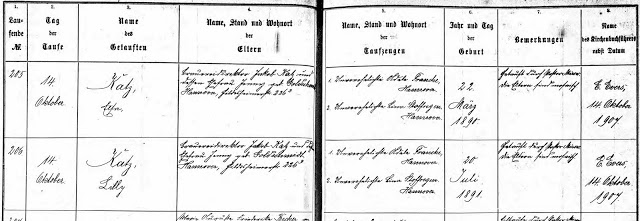
Growing up, the girls likely saw little of their father, for he was a very successful businessman. Jacob was the managing director of the Germania Brewery, which he had founded in 1898, along with several shareholders (mostly publicans and beer distributors). The brewery and its shareholders experienced a roaring success for several years but with the advent of World War I, beer sales fell dramatically. The shareholders of the brewery were presented with a generous takeover bid from a consortium of other breweries in 1917 and agreed to sell. Upon purchasing the brewery, the consortium promptly shuttered the doors of the Germania Brewery.
Seeing an opportunity, Jacob and his shareholders purchased the old brewery grounds and buildings from the consortium and founded Heuweg-Werke (Hannoversche Eishaus- und Waren-Einkaufs-Gesellschaft), a clear-ice manufacturing plant. Electrically powered refrigerators were still a thing of the future and instead every household had an icebox to keep perishable food items cool. The iceboxes necessarily required ice and Jacob’s venture was another great success. The ice factory was outfitted with the most modern equipment and was soon producing thousands of kilograms of ice.
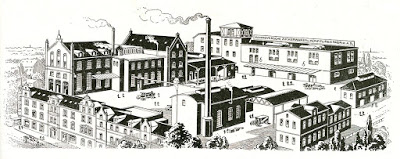
So successful was the business that Jacob and his shareholders soon expanded operations and added three departments: wine wholesales, a chocolate factory and a restaurant supply division (for porcelain, cigars, cigarettes, etc.). Soon, in addition to the 800 shareholders, the company was employing 200 workers. On August 1, 1929, in the face of the Great Depression, Jacob resigned as director. His successor restructured the company, paring off the various departments so that eventually the company was again focused on the manufacture of clear ice. Jacob had made an enormous amount of money through his business acumen and his daughters were likely accustomed to the finer things in life.
Sisters and Divorcées
In 1913, Lily married Ludwig Sauer, a German Jewish lawyer from Hannover. Their only child, Lothar Sauer was born on 12 August, 1914, in Hannover. Unfortunately, the marriage was not a happy one and in 1920 Lily divorced Ludwig. While Ludwig ended up in Brussels, Lily and Lothar made their way to Berlin.
Elsa had a similar story of marital woes. She married Alfons Anastasius Majewski and their union also ended in divorce, albeit without any children. The date of their marriage and subsequent divorce is unknown but Elsa and Anton were both living in Magdeburg in 1915, albeit at different addresses. There is a 1918 marriage registration in Magdeburg for an Alfons Gregor Anastasius Majewski, likely our fellow.
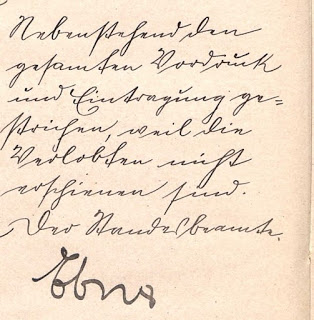
While it appears that Elsa never remarried, I did find an incomplete marriage registration for Elsa (Katz) Majewski and Walter Georg Heinrich Gross in Berlin from 8 December 1919. There are no witnesses listed and the information is crossed out, so it would appear that the marriage never took place. A marginal note essentially states that the wedding did not take place because neither of the two wedding parties showed up.
Nevertheless, it is interesting in that the document gives Elsa’s occupation as “opera singer”. Later, Elsa would give her occupation as “nurse”. In addition, Walter Gross was living at Pfalzburger Strasse 15, the building next to where Josef Jakobs and his parents were living. Elsa, on the other hand was living across the street at Pfalzburger Strasse 71. At one point in time, Kaspar Jakobs and his family had lived at Pfalzburger Strasse 72 – it’s a small world in Wilmersdorf apparently!
The Berlin marriage records are closed for 100 years so the 1919 records just got released. It is unknown if Elsa and Walter’s marriage actually went through after 1920. Although, given that Elsa’s name remained Majewski,this would seem doubtful.
Berlin
In 1926, Lily married Franz Lorenz Knips, a German Catholic, in Schöneberg, Berlin. Franz was the director of the Niederlausitzer Kohlewerke A.G. (a coal company) and a wealthy man. Born in Fulda on 21 July 1883, Franz had earned his doctorate in 1911 from Ruprecht-Karls-Universität Heidelberg. The title of his dissertation, “Entwicklung und Tätigkeit der Bank für Handel und Industrie” can be roughly translated as “Development and Activity of the Bank for Trade and Industry”, a rather dry topics and it would appear that Franz was likely involved in the financial aspects of the coal company.
Shortly after receiving his doctorate, Franz had married Anna Margarete Lötzsch in Berlin in 1913 but the couple divorced in 1925. Lily would later tell the MI5 interrogators that Franz had a daughter (Hildegard (née Knips) Maronn) from a previous marriage. Franz and Lily had no children together but Lily thoroughly enjoyed life in the cosmopolitan city of Berlin and Franz doted on his step-son, Lothar. From 1929-1933, Lily and Franz lived at Apostel-Paulus Strasse 20 in Schöneberg and, in 1934, moved a few blocks south to Freiherr-vom-Stein Strasse 8. Their new house faced Stadtpark Schöneberg (now Rudolph-Wilde Park) and was located in a much sought-after area of Berlin.
On 6 January, 1934, at the age of 19, Lily’s son, Lothar left Germany to study in England. He stayed with his uncle Mr. Heilbron and studied at the London School of Economics. Lothar’s visa only allowed him to stay in England for two months, so at the end of January, his solicitors wrote to the Home Office and asked permission for Lothar to stay indefinitely so that he could continue his studies. In early February, Lothar was granted permission to stay until August 6, 1934.
Lothar’s step-father, Franz, was a generous man and supported Lothar during his studies. After completing his courses at the London School of Economics, and presumably receiving permission to stay longer, Lothar continued his studies at the Institute of Actuaries and eventually at Pitman’s College.
The Beginning of the End
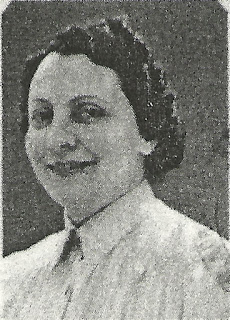
On 27 June, 1935, tragedy struck in Berlin when Franz passed away at the relatively young age of 52. He left Lily a small fortune and she continued to live at their home at Freiherr-vom-Stein Strasse 8 in Berlin for another six months. Lily then moved out of her home and lived in a hotel for two years. In 1937 she took a flat in Wielandstrasse 30. These moves may have been precipitated by the deteriorating situation in Germany as regards the Jews, something that caused Lily deep anxiety. Her non-Jewish husband had died and the Nazi vice grip was slowly strangling the life out of German Jews. By 1938, Lily was desperate to get out of Germany.
Lily’s son, Lothar, had returned to Germany for short holiday visits and was undoubtedly disturbed with each visit to witness the changes that the Nazis wrought in his home country. Lothar knew that he would not be returning to Germany, a country he barely recognized, and on June 11, 1936, wrote to the Home Office requesting an extension of his landing permit so that he could take up employment in an insurance office. His permit was granted and on September 1, 1936, Lothar took a job at E.B. Nathans.
In June 1938, Lily was introduced to Josef Jakobs by a Jewish woman named Frau Reiwald, a former patient of Josef’s dental practice. As a Jew, Lily was anxious to leave Germany and Frau Reiwald told her that Herr Jakobs could help her. Josef told Lily that he could get her any kind of passport, for a fee. He let her know that he had helped the sister of “Frau Doktor Joseph Thal” (her former neighbour at Freiherr-vom-Stein Straße 8), one Fräulein Schachtel, procure a Finnish passport from his contact (Ziebell) for a mere 80,000-120,000 RM. After meeting Josef’s contacts, Ziebell and Rammrath, Lily decided not to use their “services” (suspecting that they were illegal) and sought to escape Germany via alternate means. Lily continued to see Josef at the local tennis club where he tried to involve her in several other shady financial deals. She eventually took him to Hannover to meet her father, Jacob Katz, still a shrewd businessman even at the age of 83. Lily’s father quickly assessed Josef as a scoundrel and a schemer and advised his daughter to have nothing more to do with him!
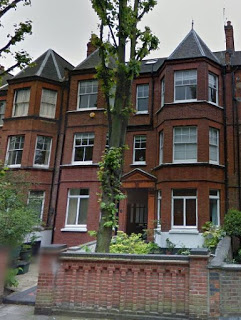
In September 1938, Lily visited her son in England, through whom she was also trying to secure entry into England. Lothar wrote to the Home Office in early September asking them to issue his mother a visa so that she could reside in England as he would fully support her. In expectation of her successful application, Lothar secured a flat for her at 9 Compayne Gardens.
In mid-September, Lily returned to Germany from London and tried to extricate herself from some of the financial deals that she had entered into with Josef. She ended up selling her car to Josef and told him about her new address in England. In October 1938, Josef came to her flat and told her that some of his passport cronies had been arrested and imprisoned. Lily never saw Josef again and, in December 1938, learned from his wife, that he too had been arrested and imprisoned. For Lily, too, the net was tightening and in October 1938, she, like every other Jew in Germany was forced to add a “Jewish” forename to her name. She was now known as Lily Sara Knips. In January 1939, Lily and her solicitors wrote to the Home Office asking for a decision on her visa application as she was suffering from“severe nervous strain on account of the present situation in Germany as regards Jews”
Associated with a Spy
Frau Knips was finally granted a visa and entered England on 24 April, 1939, with the understanding that she take no paid or unpaid employment while in the United Kingdom. Lily settled at 9 Compayne Gardens where she rented out rooms to boarders. In September 1939, five months after her escape from Nazi Germany, Lily’s son Lothar Sauer married Hermine Apfel (a Jewish refugee from Austria) in Hampstead.
During their questioning of Frau Knips, the MI5 officers chose an opportune moment to show her a picture of Josef Jakobs. She was noticeably distressed at his dishevelled appearance. The officers concluded that Lily’s relationship with Josef was of a personal nature and that she was likely not a danger to the security of England. One of the officers thought that her relationship with Josef might have been more intimate than she admitted. While relating a conversation that she and Josef had had, Lily used the familiar form of “you” (Du), generally only reserved for close family and friends.
Lily also mentioned that she had received a couple of mysterious letters the previous year (1940). The first letter was incorrectly addressed to 19 (or 29) Compayne Gardens and arrived in the late summer of 1940 with a postmark from Holland (or Denmark). Poorly written in Germany, the letter writer asked Lily to pay 40,000 Marks to an American bank to the account of some lady whose name Lily did not recognize (and had since forgotten). The letter writer also requested that Lily travel to Switzerland and visit them, but the signature was illegible. Lily gave the letter back to the postman and told him that it must have been intended for some other person. The second letter was addressed to 9 Compayne Gardens and arrived shortly after Christmas 1940 with a postmark from Shanghai. It was signed by a Frau Goldstein who said that she had been informed by Herr Jakobs that he had given Lily 40,000 Marks on Frau Goldstein’s behalf. Lily was told to send that amount to Frau Goldstein’s bank in Shanghai. Frau Goldstein mentioned that Herr Jakobs had already written to her concerning the matter, at which point Lily recalled the earlier letter and thought that it must have come from Josef. Frau Goldstein mentioned that Lily had met her husband with Herr Jakobs in Berlin and that both had been released from prison on 24 March 1940. Lily destroyed that letter. MI5 put a trace on the first letter with the Post Office but nothing seems to have come of that. We’ll revisit the second letter in a later blog post about Goldstein…
While Josef was held and interrogated at MI5’s Camp 020, Lily’s life went on. She may have wondered what had become of him and was likely distressed to read newspaper accounts of his execution at the Tower of London on 15 August 1941.
Family Tragedy
What became of Lily Knips? What became of her sister, Elsa Majewski? What became of their Jewish father, Jacob Katz, still alive in Hannover in 1941?
Mercifully, Jacob Katz passed away on 15 April 1942 in Hannover. He, at least, would manage to avoid the Nazi death camps. It is unknown what became of his wife Jenny (née Goldschmidt) Katz. [N.B. 2020 – I have since learned that Jenny Katz passed away on 25 February 1922 in Hannover.]
Lily’s sister, Elsa Majewski, was not so fortunate. On 13 June, 1942, Elsa war herded aboard an “Osttransport“ at Gleis (Track) 17 in Bahnhof Grunewald and deported to Sobibor extermination camp. The date of her murder is unknown.
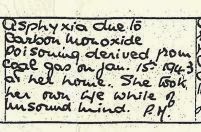
We also don’t know when, or if, Lily received news of the deaths of her father and sister. What is known is that on 15 January 1943, Lily Knips passed away at the young age of 52 years. According to the coroner, Lily Knips died of “asphyxia due to carbon monoxide poisoning derived from coal gas on 15 January, 1943 at her home”. One could think that it was a tragic accident except for the final sentence: “She took her own life while of unsound mind”.
So ended the tragic life of Lily Knips. She had escaped the Nazi terror in Germany, albeit leaving her father and sister behind. She had set herself up in a new life in England, close to her son and his wife. Her life was perhaps overshadowed by the capture and death of Josef Jakobs. She had so much to live for and yet… she could not hold out.
Even Lily’s son struggled to overcome the tragedy that seemed to follow the Katz clan. He passed away in 1962 at the age of 48 years. His wife, Hermine, however lived to the ripe old age of 87 and passed away in 2001 in Camden, London.
Sources
Recollections by Lily’s granddaughter at a Holocaust memorial in Berlin – 4 May 2019
Stolpersteine in Berlin site – Elsa Majewski
Germania Brewery – info on the history of the brewery
Eisfabrik site – theatre group operating out of the former Germania Brewery/Heuweg factory site – some great photos
National Archives – KV 2/24, 25, 26, 27
GRO – death registration of Lily Knips
Note
Berlin marriage and death records are closed for 100 years and available on Ancestry up until 1920 with nothing beyond that.
2021 03 15 – Berlin marriage registers are now available to 1936 on Ancestry. It would appear that Elsa (Katz) Majewski did not remarry.
